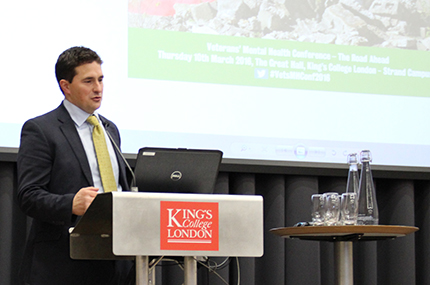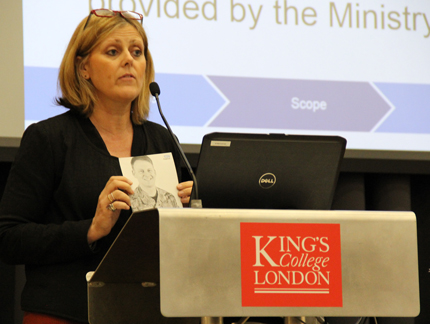Experts gather to discuss future of veterans' mental health
Leading experts in the field of veterans’ mental health gathered at King’s College London yesterday (Thursday 10th March 2016) to explore how services for Veterans and Service Families could be improved. The one-day event, ‘Veterans’ Mental Health – the Road Ahead’, followed the great success of the inaugural ‘Veterans’ Mental Health – Fact, Fiction and Future’ conference of March 2015.
Hosted by the King’s Centre for Military Health Research and sponsored by Forces in Mind Trust, the aim of the event was to promote and encourage contributions to understanding and supporting the mental health needs of veterans based on robust research, evidence and fact, rather than the hearsay and anecdote that too often obscure the topic.
More than 200 guests heard speakers with global reputations from a broad range of leading UK and international organisations spanning the political arena, the NHS, the Metropolitan Police, academia and the Service charities sector. Speakers offering insights included Johnny Mercer, MP for Plymouth Moor View, on the view of veterans’ mental health needs from inside the House of Commons; Professor Edgar Jones, Institute ofPsychiatry, Psychology & Neuroscience (IoPPN), King’s College London, on how the treatment of veterans with psychological disorders in former conflicts can inform current thinking; and DS John Arnold, National Counter Terrorism Policing HQ, on the relationship between veterans and radicalisation.

Johnny Mercer MP
Neil Greenberg, Professor of Defence Mental Health at King’s College London, said: 'The King’s Centre for Military Health Research aims to generate high quality evidence in order to improve the understanding of the health of service and ex-service personnel and their families. The key purpose of doing such research is ultimately to improve the ways that the UK, and our international partners, provide support and care to the military community for the benefit of all. I am delighted that some many people attended our 2nd Annual Veterans’ Mental Health conference which is testament to the great speakers and fantastic networking opportunities. We purposely aim to ensure these events are very reasonably priced as we consider that access to high quality CPD should be within the reach of anyone. We are grateful to the Forces in Mind Trust (FiMT) for sponsoring the meeting and very much hope that attendees will be inspired to apply to carry out further research to advance the field for the benefit of all.'
Ray Lock, Chief Executive of the Forces in Mind Trust and a conference speaker, said: 'We are proud to have sponsored this prestigious event at which the calibre of delegates and the quality of discussion were very high indeed. Amongst the founding priorities of the Trust are ‘to promote better mental health and well-being’ and ‘to build organizations’ capacity to deliver evidence-based prevention and rehabilitation’. These priorities represent key aspects of our vision, which is that all ex-Service personnel and their families lead successful and fulfilled civilian lives, and our mission, which is to enable them to make a successful and sustainable transition. The realisation of this vision in part depends on understanding and meeting the mental health needs of veterans and their families; we are therefore delighted that this well-attended and well-received conference so effectively shared knowledge and considered the way forward in this field. It was the ideal place to launch our consultation on the direction and priorities of our Mental Health Research Programme.'

Kate Davies OBE, NHS England
The full programme for the day was as follows:
Welcome from Professor Sir Simon Wessely, President of the Royal College of Psychiatrists
‘The view from inside the House of Commons’, Johnny Mercer, MP for Plymouth Moor View
‘The view from the NHS’, Kate Davies, OBE, NHS England
‘The view from the Service Charities’, Lt General Sir Andrew Ridgway, KBE CB, Cobseo
‘The view from the US’, Col Carl Castro, Assistant Professor, University of Southern California
‘Treatment of Veterans with psychological disorders: evidence from former conflicts’, Professor Edgar Jones, Institute of Psychiatry, Psychology and Neuroscience, King’s College London
‘Novel trauma focused psychological therapies for Veterans and Families’, Dr Neil Kitchiner, Veterans’ NHS Wales
‘Return to work as a credible mental health treatment outcome’, Jan Hutchinson, Centre for Mental Health
‘Veterans and Radicalisation’, DS John Arnold, National Counter Terrorism Policing HQ
‘Veterans and the Criminal Justice System – Project Nova’, Ed Parker, Walking with the Wounded
‘Funding research as a means to influence Veterans’ health and social care policy’, AVM Ray Lock, CBE, Forces in Mind Trust
‘The mental health of the Wounded Injured and Sick’, Professors Paul Cullinan, Imperial College London and Nicola Fear, King’s College London
‘Stigma, Help-seeking and Veterans’, Marie-Louise Sharp, The Royal British Legion
‘The ‘Veterans mental health roundtable’ and the road ahead’, Andy Bacon, NHS England and Professor Neil Greenberg
Summary and Close from Professor Neil Greenberg
Notes to editors
For further media information please contact Jack Stonebridge, Press Officer, Institute of Psychiatry, Psychology & Neuroscience, King’s College London on jack.stonebridge@kcl.ac.uk or (+44) 0207 848 5377.